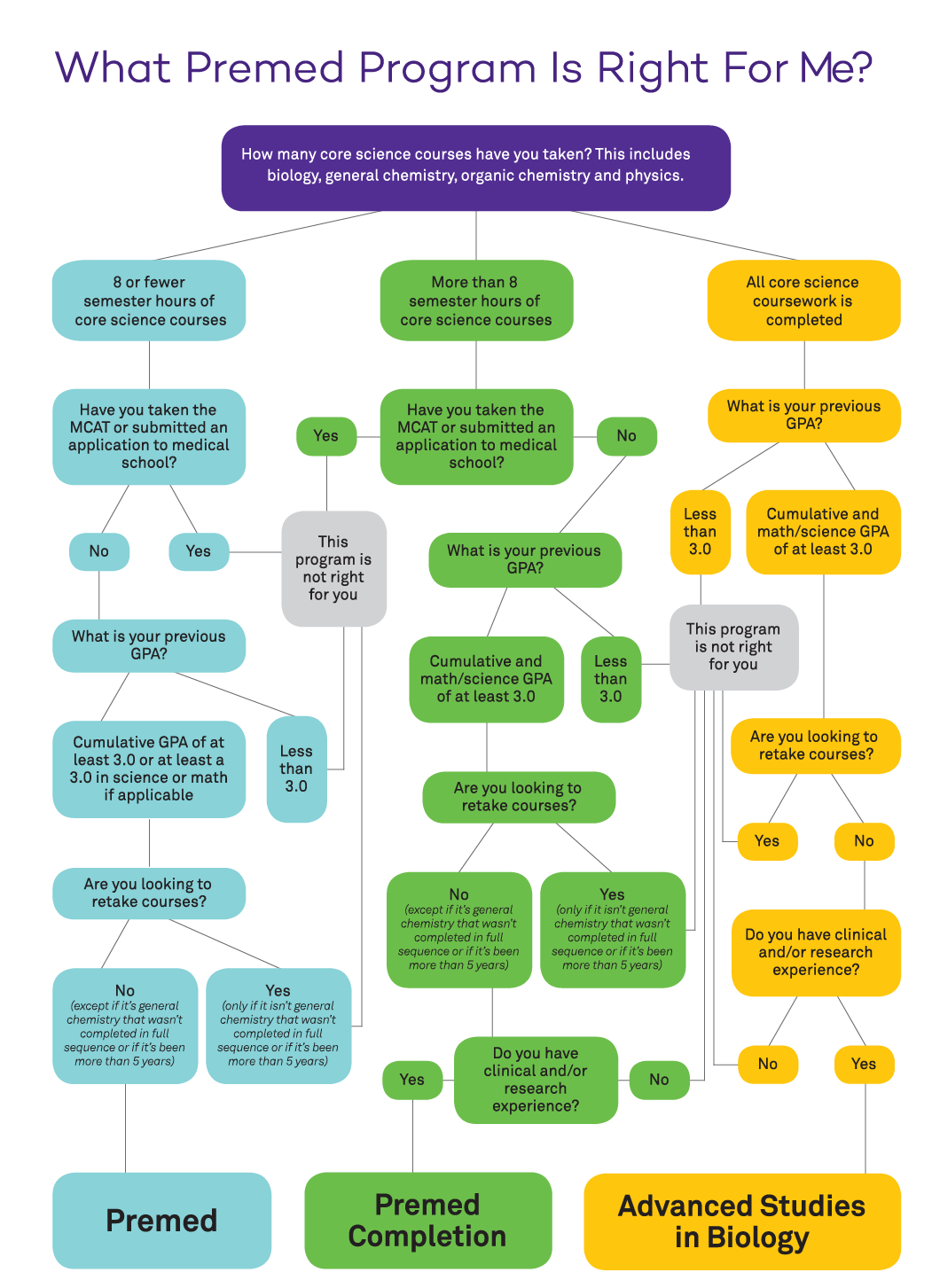Premedicine Completion Program
The Premedicine Completion Program is intended for students who have completed more than eight semester hours, or twelve quarter hours, of core prerequisite coursework needed to apply to medical school. Students in this program may take their remaining core classes through SPS and receive the same student services as those in the premedicine post-baccalaureate program. This program is not intended as a records-enhancement program. Students who have completed all their pre-medical coursework should not apply.
Students must complete the program within 12 calendar months and be enrolled in at least two units of coursework per term to be eligible for financial aid. Due to the sequential nature of the coursework, students may only begin the program in the summer or fall quarters.
Students who plan to enroll in this program during the summer immediately following the completion of their undergraduate degree may not be eligible for financial aid during that summer, depending on previous aid awards for that academic year. Please contact the Chicago Office of Financial Aid for more information.
START MY APPLICATIONRequest Information ATTEND AN INFORMATION SESSION
Is the Premedicine Completion program right for me?
The School of Professional Studies offers a several program options for students who need to complete the required science courses necessary to pursue graduate level study in the medical field. Expand this page using the "Explore" link below to see which of our program options is the best fit for your background. Please reach out to our Enrollment Advising team if you have any questions before you start the application process.
About the Premedicine Completion Program
- Premedicine Completion Program Required Courses
- Transfer Credit Policy for Premedicine Completion Program
- Premedicine Completion Program Tuition
- Admission for Premedicine Completion Program
- Premedicine Completion Program Registration Information
- Premedicine Completion Program Sample Course Plans
- Find out more about the Premedicine Completion Program
Premedicine Completion Program Required Courses
Course plans will vary based on each student’s previously completed coursework. Upon admission into the program, students should consult with their academic advisor to create a plan of study. In order to receive a letter of completion, students must complete their individual required courses as determined in the initial advising meeting, and must complete a minimum of 4 units with a 3.0 GPA.
Courses are selected from the following:
- General Chemistry Sequence (CHEM 110, 131, 132 and 141, 142*)
- Organic Chemistry Sequence (CHEM 215-A,B,C and 235-A,B,C*)
- General Biology Sequence (BIOL SCI 201, 202, 203*)
- General Biology Labs (BIOL SCI 232, 233, 234*)
- Biochemistry (BIOL SCI 308)
- General Physics Sequence (PHYSICS 130-A,B,C and 131-A,B,C)
Elective courses
In addition to core requirements, students may select two of the courses from the list below. These are courses required by some but not all medical programs. To make the best course selection, students should consult their target program requirements to determine which of the courses best fit their needs.
- BIOL SCI 310: Human Physiology
- BIOL SCI 312: The Evolutionary Biology of Human Anatomy, Health and Disease
- BIOL SCI 313: Human Anatomy
- BIOL SCI 328 Microbiology
- BIOL SCI 355 Immunobiology
- *CHEM 215-C: Organic Chemistry III (with lab CHEM 235-C); 1.34 units
- ENGLISH 111: Writing Seminar
- ENGLISH 205: Intermediate Composition
- KINS 237: Foundations of Human Movement
- MATH 220-A: Single-Variable Differential Calculus
- MATH 220-B: Single-Variable Integral Calculus
- PRO HLTH 390: Interprofessional Health Practice
- PSYCH 110: Introduction to Psychology
- SOCIOL 303: Analysis and Interpretation of Social Data
- STAT 202: Introduction to Statistics & Data Science
Chemistry Notes:
*If you have successfully completed a year of General Chemistry with lab at another institution and you plan to register for Organic Chemistry, please note that the Northwestern Department of Chemistry requires a Chemistry Placement Test. This exam ensures that students who have studied chemistry at an outside institution are prepared to succeed in Northwestern University’s Organic Chemistry sequence. The online Chemistry Placement Test can be scheduled at your convenience. Please contact your academic adviser to get started.
Due to Northwestern Department of Chemistry policy, students may not begin a chemistry course in the middle of a sequence. Students who need to complete a chemistry course must take the entire sequence at SPS.
Biology Notes:
*It is strongly recommended that students who need to complete the biology sequence begin the Premedicine Completion program in the summer term.
Transfer Credit Policy for Premedicine Completion Program
Transfer credit is not accepted into this program. However, the program’s flexibility allows students to enroll in only the courses that they need.
Premedicine Completion Program Tuition
Post-baccalaureate students at Northwestern's School of Professional Studies pay per course. For more information about financial obligations and tuition, please visit the Tuition page.
Admission for Premedicine Completion Program
In addition to completing an online application, you'll also need to submit a few supplemental materials. A list of requirements for admission including application deadlines and tips on how to apply can be found on the Admission page.
Premedicine Completion Program Registration Information
Whether you're a first-time registrant or current and returning student, all students register using our online student registration and records systems. Important information about registering for courses at SPS, including registration timelines and adding or dropping courses in which you are already enrolled, can be found on the Registration Information page.


